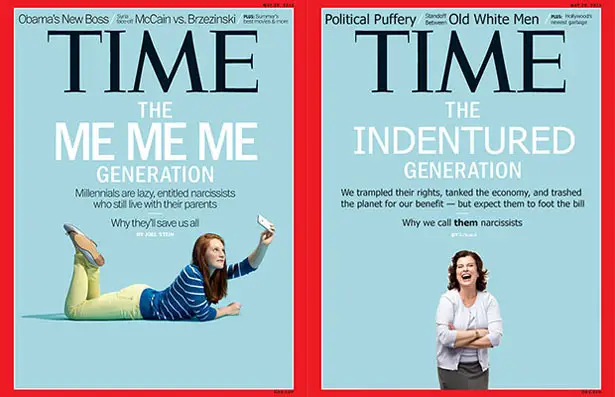When millennials enter the “real world,” they tend to encounter offensive stereotypes that apply to their generation. Many of these “observations” come from the baby boomer generation, who often fear job that millennials are threatening their jobs.
Ironically, many millennials are the children of baby boomers, which may explain why these stereotypes are extremely childish and blown out of proportion. Even funnier, I’ve noticed many of these “millennial traits” in middle-aged people, which brought me to the following conclusion: Baby boomers are more millennial than millennials.
1. They’re Entitled
Not once in my five years as a Dairy Queen cashier did I meet an outright rude, ignorant millennial. Sure, I encountered a somewhat impudent teenager every now and then, but I was never verbally attacked by one.
However, baby boomers are quick to jump down my throat if I accidentally charge them an extra 20 cents for an ice cream cone.
Members of the older generation often imply that mistakes are entirely avoidable, especially when it comes to simple tasks or minimum wage jobs. Therefore outright disrespect to young cashiers, who are often in high school, reeks of entitlement to me, especially when the disrespect is coming from someone who is older and doing well financially.
Additionally, middle-aged people today tend to view millennials as entitled, self-righteous beings, as they’ve grown up in an increasingly technological age, where inconvenience simply “doesn’t exist” — or so they assume. Well, technology and its many attributes aren’t exclusively to millennials, and baby boomers tend to be “device addicts” themselves because, despite age, electronics (such as smartphones and computers) are inescapable.
2. They’re the “Me” Generation
Baby boomers often believe millennials to be ignorant and self-involved, when in reality baby boomers are considered the “Me” generation. According to Time, millennials are “lazy, entitled narcissists who still live with their parents”; then, just this past May, the cover of Time read: “How Baby Boomers Broke America.”

The article describes how millennials are prone to fixing the mistakes of baby boomers: “The new achievers are doing what they do not because they are gluttons for frustration, but they believe that America can be put back on the right course.” Millennials are constantly accused of being lazy, self-absorbed beings who don’t take responsibility for their actions.
If anything, baby boomers are pinning their own mistakes onto the younger generation, holding millennials accountable for America’s “downward tailspin.” While middle-aged people typically view millennials as self-involved and arrogant, what’s more egotistical than accusing others of your own wrongdoings? Especially “innocent blunders” that broke an entire country.
3. They’re Impatient
If a baby boomer needs something, they require it right then and there. I can personally vouch for this trait, as I have many middle-aged relatives who tailor chores and events to their own time schedule. Working in food service, I have seen plenty of baby boomers become flustered and openly disrespectful if they have to wait more than five minutes for their ice cream.
On top of impatient, another common misconception about millennials is they’re always needy and inconsiderate, though these traits tend to be more evident among members of the baby boomer generation. I will admit, technology and the increasingly efficient internet makes patience a virtue, as nearly all of life’s inquiries can be answered in less than a second.
However, real-life interaction is entirely different, and I would never be openly rude or disrespectful to an innocent cashier, as opposed to my middle-aged counterparts. While technology definitely contributes to our increasingly impatient society, baby boomers tend to be outwardly needy and quickly irritated (despite their growing up without the technology we have today), especially when compared to millennials.
4. They’re Addicted to Technology
While they may not be as tech-savvy as millennials, baby boomers are often addicted to their devices.
Cell phones, for instance, have had a resounding impact on the lives of both baby boomers and millennials, as they’ve nearly become the primary means for human interaction. Not to mention, cell phones provide access to social media, games and email, all of which are key points of interest to baby boomers.

Just a few years ago, middle-aged people discovered Facebook, which was primarily populated by millennials during the mid-to-late 2000s. When the older generation became Facebook-active, millennials shifted their internet use to other social media platforms, such as Twitter and Instagram.
While millennials were quick to set a technological trend, baby boomers were quick to follow in their footsteps, only to use a specific social media platform or a piece of technology until it becomes outdated and, quite frankly, unappealing.
Additionally, millennials and their middle-aged counterparts tend to use social media differently, especially when it comes to a Facebook status or an Instagram post. A younger person, for instance, typically posts on occasion, not exceeding once a day. Enter a baby boomer, who updates their account in the morning, afternoon, evening and any time in between. Three posts a day? Sounds a bit excessive to me.
5. They Can’t Take Criticism
Baby boomers don’t take negative feedback well, especially when the judgments or criticisms come from a millennial. A common stereotype about workplace millennials implies that young people today are overly sensitive and incapable of accepting disapproval.
While I’m often sensitive to suggestions of improvement, I attribute that sensitivity to my slight perfectionism, though my perfectionism is not nearly as strong as that of my father or my grandparents. However, I’ve noticed a difference between my acceptance of negative feedback and that of my older relatives. I’m only particular about the hobbies and activities that I’m passionate about.
Writing, for instance, has always been one of my strong suits and a passion of mine, and I tend to be exceptionally picky about diction and grammar. Baby boomers, on the other hand, can’t be told that their shoelace is untied without snapping — believe me, I’ve experienced it. And despite this sensitivity, baby boomers tend to be blunt and often harsh when delivering negative feedback, which may be why the “sensitive millennial” stereotype came to be in the first place.
















